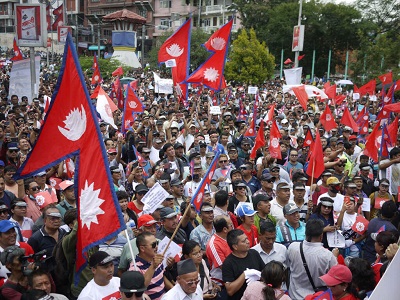Context-
India-Nepal relations have always been a mix of shared history, cultural ties, and political complexities. As India navigates its foreign policy priorities, particularly concerning China, maintaining and stabilizing its relationship with Nepal has become increasingly significant.
Political and Economic Turbulence in Nepal
● Restlessness and Uncertainty: Nepal is currently experiencing a period marked by restlessness, dissatisfaction, and uncertainty. The transition to a fully-fledged democracy, underpinned by credible political institutions, appears to be an unending journey. The hasty adoption of a new Constitution, which transformed Nepal into a secular federal democratic republic, has raised numerous questions. This transformation occurred during a time when Nepal, a young democracy, had just emerged from a series of upheavals and lacked experienced leaders and robust institutions to tackle the accompanying challenges.
● Debates on Secularism and Monarchy: The decision to adopt a secular identity, moving away from its deep-rooted Hindu traditions, has been contentious. Many wonder if Nepal should revert to its Hindu identity, a status it relinquished during negotiations between political parties and the Maoists to end a decade-long insurgency. Additionally, there are calls for restoring the monarchy to ensure that political boundaries are respected and democracy is safeguarded. The effectiveness of a federal setup is also questioned, with concerns that it might lead to disunity within the country.
External Influences
● Changing Coalition Dynamics: The political landscape in Nepal has seen significant changes, particularly with the coalition partners of the incumbent Prime Minister, Maoist leader Pushpa Kamal Dahal ‘Prachanda’. The centrist Nepali Congress (NC), the largest party in Parliament, has been replaced by the second largest party led by K.P. Sharma Oli. Oli, during his previous tenure as Prime Minister, was known for his pro-China and anti-India stance. The Chinese were quick to welcome the renewed alliance between the major left parties, a move they had long advocated.
● China's Growing Influence: China's influence in Nepal is growing, marked by high-level military visits and agreements on reviving cooperation under the Belt and Road Initiative (BRI), despite domestic warnings about potential debt traps similar to Sri Lanka's experience. Nepal's Foreign Minister's decision to visit Beijing before New Delhi was a significant departure from convention, highlighting Nepal's shifting foreign policy priorities. China's proactive stance in Nepal aims to expand its influence at India's expense.
Historical Context and Security Concerns
● Past Instability and Cross-Border Threats: During the last years of King Birendra's reign, political instability and frequent changes in government facilitated the spread of a Maoist insurgency within Nepal. This period also saw an increase in smuggling, arms trafficking, and cross-border terrorism activities against India, masterminded from Pakistan. The hijacking of flight IC 814 in December 1999 was a notable example of these threats. Despite these challenges, the 'twin pillar' policy of supporting the king and multi-party democracy maintained a stable India-Nepal relationship, fostering cooperation between Indian and Nepalese intelligence agencies to counter Pakistani involvement.
● Current Security Risks: Today, unlike in the past, China actively works against India in Nepal. China's support for cross-border terrorism activities against India, categorized as "good terrorism" by Beijing, poses significant security risks. Pakistan, seeing an opportunity, aligns with China to further destabilize the region. While India has allies in the Quad (Australia, India, Japan, and the United States) and other Indo-Pacific groupings, reliance on these alliances may not be sufficient if a new Great Game begins in an unstable Nepal.
India's Diplomatic Strategy
● Maintaining a Low Profile: India has wisely maintained a low profile, avoiding interference in Nepal's internal affairs. However, there are pressures from some Nepali quarters for India to offer advice, particularly on two contentious issues: whether Nepal should revert to its Hindu identity and whether the monarchy should be restored. India must tread carefully, providing thoughtful responses to avoid sending mixed signals.
● Proposing a Holistic Development Roadmap: To stabilize the relationship, India could propose a transformative and sustainable development agenda for Nepal. This roadmap should focus on improving the quality of life across various sectors, such as health, education, food and nutrition, child development, gender equality, and job creation. By addressing these areas, India can offer an attractive alternative to Chinese projects under the BRI, ensuring that economic cooperation prioritizes the well-being of the Nepalese people.
● High-Level Engagement: High-level engagement from India can inject optimism and stimulate investment in key sectors. Promoting cross-party consensus on major projects will ensure continuity and time-bound results, even amidst political instability. Strengthening inter-linkages between industries in both countries can address demographic challenges and foster a sense of equality and sovereign space within Nepal.
● Leveraging Common Civilizational Assets: India should leverage the common civilizational assets that make the India-Nepal relationship unique. This includes cultural, religious, and historical ties that bind the two nations. By emphasizing these shared values, India can foster goodwill and mutual respect, overcoming the big brother-small brother syndrome that often complicates bilateral relations.
|
Probable Questions for UPSC Mains Exam-
|
Source- The Hindu









